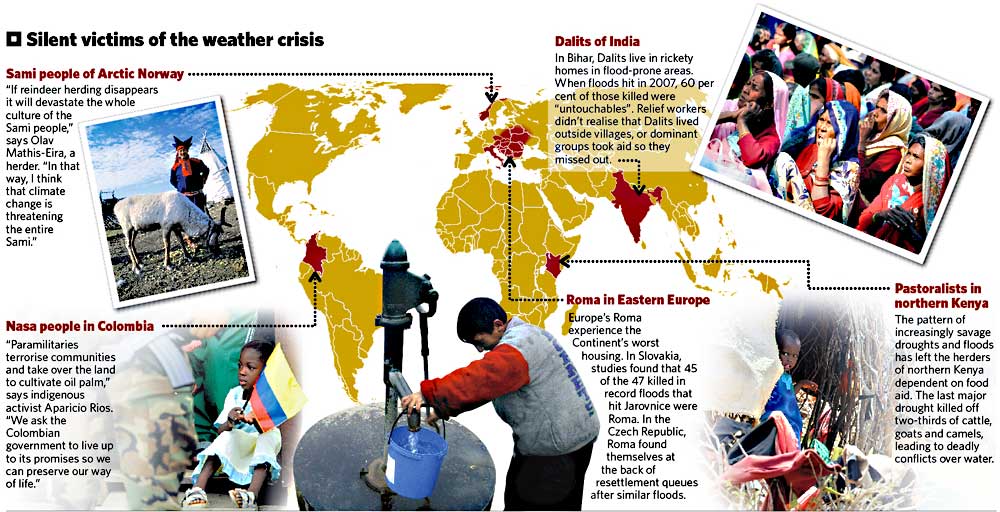Climate change 'hits minorities hardest'

Your support helps us to tell the story
From reproductive rights to climate change to Big Tech, The Independent is on the ground when the story is developing. Whether it's investigating the financials of Elon Musk's pro-Trump PAC or producing our latest documentary, 'The A Word', which shines a light on the American women fighting for reproductive rights, we know how important it is to parse out the facts from the messaging.
At such a critical moment in US history, we need reporters on the ground. Your donation allows us to keep sending journalists to speak to both sides of the story.
The Independent is trusted by Americans across the entire political spectrum. And unlike many other quality news outlets, we choose not to lock Americans out of our reporting and analysis with paywalls. We believe quality journalism should be available to everyone, paid for by those who can afford it.
Your support makes all the difference.When the floods subsided in India last year more than half of the bodies found were Dalits, or untouchables; the recent droughts in Kenya have devastated the herds pastoralists in the north rely on for survival; in Arctic Norway the Sami people's reindeer are starving as warmer rains destroy their grazing land.
Around the world, the reality of dangerous climate change is being felt and its full force is striking the people least equipped to cope, ethnic or religious minorities and indigenous peoples. Minorities from Latin America to Europe and Asia have been caught in man-made environmental disasters, and in many cases relief is reaching them last, says a report to be released today by the international non-government organisation, Minority Rights Group.
Greenhouse gases from industrialised nations are profoundly changing global weather patterns with disastrous consequences for poorer countries. Already a major UN effort is underway to find a formula for richer polluting nations to pay for the "climate-proofing" of the developing world, but concerns are mounting that groups living on the margins of these societies will not be protected.
The report says the very survival of fragile communities is at stake unless policy-makers pay urgent attention to their plight. "Climate change has made it to the top of the international agenda but at every level, be it intergovernmental, national or local, recognition of the acute difficulties that minorities face, is often missing," said Minority Rights Group's Ishbel Matheson, one of the report's authors. Making matters worse, the charity argues, is that minorities have faced discrimination in the wake of weather disasters. In the wake of flooding in Bihar Dalit, communities found aid took longest to reach them and they were subject to "blatant" discrimination.
Climate change is also playing havoc with traditional communities' reliance on the land. David Pulkol, a spokesman for the Karamajong community in Uganda, says: "In our community, the elders interpret certain signs from nature to know when to plant their crops or when to start the hunting season. But with climate change it is becoming impossible to make such predictions."
The European Union and the UN have recognised the security implications of climate-led disasters striking poorer countries, pointing to the increased likelihood of wars and mass migration. Achim Steiner, the head of the UN Environment Programme has linked climate change to the conflict in Darfur and warned: "Societies are not prepared for the scale and the speed with which they will have to decide what they will do with people."
Were global carbon emissions to be cut by half today, any mitigating effects on climate change would take at least two decades to appear. In the short term, we are locked into global warming, so efforts to "climate-proof" the nations set to be hit hardest is one of the biggest tasks facing the international community. At the UN climate talks in Bali in December, 190 nations signed up to a roadmap aiming towards a binding global deal to stave off a climate disaster. That roadmap contains commitments to massive funding to help poor countries adapt to the changes on their way, but some of the attempts to scale back the carbon economy are creating as many problems as they are relieving.
The present vogue for bio-fuels stems from the supposed triumph of the ethanol industry in Latin America but underneath this success is a story of forced evictions, land grabs and attacks on indigenous groups in Colombia, Brazil and Argentina to make way for bio-fuel plantations.
Join our commenting forum
Join thought-provoking conversations, follow other Independent readers and see their replies
Comments